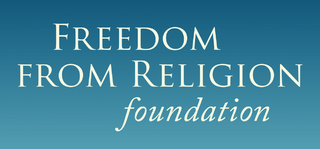Lemon v. Kurtzman, 403 U.S. 602 (1971), was a case argued before the Supreme Court of the United States. The court ruled in an 8–0 decision that Pennsylvania's Nonpublic Elementary and Secondary Education Act from 1968 was unconstitutional and in an 8–1 decision that Rhode Island's 1969 Salary Supplement Act was unconstitutional, violating the Establishment Clause of the First Amendment. The act allowed the Superintendent of Public Schools to reimburse private schools for the salaries of teachers who taught in these private elementary schools from public textbooks and with public instructional materials. Lemon was a major precedent in federal and local courts until it was effectively overturned by Kennedy v. Bremerton School District in 2022.

The Freedom From Religion Foundation (FFRF) is an American nonprofit organization, which advocates for atheists, agnostics, and nontheists. Formed in 1976, FFRF promotes the separation of church and state, and challenges the legitimacy of many federal and state programs that are faith-based. It supports groups such as nonreligious students and clergy who want to leave their faith.
Church of the Lukumi Babalu Aye, Inc. v. Hialeah, 508 U.S. 520 (1993), was a case in which the Supreme Court of the United States held that an ordinance passed in Hialeah, Florida, forbidding the "unnecessar[y]" killing of "an animal in a public or private ritual or ceremony not for the primary purpose of food consumption", was unconstitutional.
In United States law, the Establishment Clause of the First Amendment to the United States Constitution, together with that Amendment's Free Exercise Clause, form the constitutional right of freedom of religion. The relevant constitutional text is:
Congress shall make no law respecting an establishment of religion, or prohibiting the free exercise thereof...
Zelman v. Simmons-Harris, 536 U.S. 639 (2002), was a 5–4 decision of the United States Supreme Court that upheld an Ohio program that used school vouchers. The Court decided that the program did not violate the Establishment Clause of the First Amendment, even if the vouchers could be used for private religious schools.
Freedom of religion in the Philippines is guaranteed by the Constitution of the Philippines.
Employment Division, Department of Human Resources of Oregon v. Smith, 494 U.S. 872 (1990), is a United States Supreme Court case that held that the state could deny unemployment benefits to a person fired for violating a state prohibition on the use of peyote even though the use of the drug was part of a religious ritual. Although states have the power to accommodate otherwise illegal acts performed in pursuit of religious beliefs, they are not required to do so.

Freedom of religion in Canada is a constitutionally protected right, allowing believers the freedom to assemble and worship without limitation or interference.
Sherbert v. Verner, 374 U.S. 398 (1963), was a case in which the Supreme Court of the United States held that the Free Exercise Clause of the First Amendment required the government to demonstrate both a compelling interest and that the law in question was narrowly tailored before it denied unemployment compensation to someone who was fired because her job requirements substantially conflicted with her religion.
Rosenberger v. Rector and Visitors of the University of Virginia, 515 U.S. 819 (1995), was an opinion by the Supreme Court of the United States regarding whether a state university might, consistent with the First Amendment, withhold from student religious publications funding provided to similar secular student publications. The University of Virginia provided funding to every student organization that met funding-eligibility criteria, which Wide Awake, the student religious publication, fulfilled. The university's defense claimed that denying student activity funding of the religious magazine was necessary to avoid the University's violating the Establishment Clause of the First Amendment.
In Stone v. Graham, 449 U.S. 39 (1980), the Supreme Court of the United States ruled that a Kentucky statute was unconstitutional and in violation of the Establishment Clause of the First Amendment, because it lacked a nonreligious, legislative purpose. The statute required the posting of a copy of the Ten Commandments on the wall of each public classroom in the state. The copies of the Ten Commandments were purchased with private funding, but the Court ruled that because they were being placed in public classrooms they were in violation of the First Amendment.
Texas Monthly v. Bullock, 489 U.S. 1 (1989), was a case brought before the US Supreme Court in November 1988. The case was to test the legality of a Texas statute that exempted religious publications from paying state sales tax.

Davis v. Beason, 133 U.S. 333 (1890), was a United States Supreme Court case affirming, by a 9–0 vote, that federal laws against polygamy did not conflict with the free exercise clause of the First Amendment to the United States Constitution.
Walz v. Tax Commission of the City of New York, 397 U.S. 664 (1970), was a case before the United States Supreme Court. The Court held that grants of tax exemption to religious organizations do not violate the Establishment Clause of the First Amendment.

DeMarco v. Holy Cross High School 4 F.3d 166 was an employment discrimination case brought under the ADEA. The appellant, Guy DeMarco, was released from employment prior to his eligibility for tenure at the age of forty-nine. Holy Cross High School argued that it was not subject to ADEA laws, and if it were that this case against it was in violation of the Free Exercise Clause and the Establishment Clause of the First Amendment. The defendant also argued that the plaintiff failed to utilize the administrative remedies available.
Public accommodations, in the law of the United States, are generally defined as facilities, whether publicly or privately owned, that are used by the public at large. Examples include retail stores, rental establishments, and service establishments as well as educational institutions, recreational facilities, and service centers.
Barrett v. Fontbonne Academy is a Massachusetts Superior Court decision of December 16, 2015, that found that a Roman Catholic secondary school violated the state's laws against discrimination on the basis of both sexual orientation and gender when it withdrew an offer of employment from a candidate when officials learned he was in a civil same-sex marriage. It was the first decision in the United States since the nationwide legalization of same-sex marriage accomplished by the U.S. Supreme Court decision in Obergefell v. Hodges the previous June to consider the competing claims of discrimination in employment and the protections afforded religious institutions.
Freedom of religion in Montenegro refers to the extent to which people in Montenegro are freely able to practice their religious beliefs, taking into account both government policies and societal attitudes toward religious groups. Montenegro's laws guarantee the freedom of religion and outlaw several forms of religious discrimination, as well as establishing that there is no state religion in Montenegro. The government provides some funding to religious groups.
Little Sisters of the Poor Saints Peter and Paul Home v. Pennsylvania, 591 U.S. ___ (2020), was a United States Supreme Court case involving ongoing conflicts between the Patient Protection and Affordable Care Act (ACA) and the Religious Freedom Restoration Act (RFRA) over the ACA's contraceptive mandate. The ACA exempts nonprofit religious organizations from complying with the mandate, which for-profit religious organizations objected to.
Fulton v. City of Philadelphia, 593 U.S. ___ (2021), was a United States Supreme Court case dealing with litigation over discrimination of local regulations based on the Free Exercise Clause and Establishment Clause of the First Amendment to the United States Constitution. The specific case deals with a religious-backed foster care agency that was denied a new contract by the City of Philadelphia, Pennsylvania, due to the agency's refusal to certify married same-sex couples as foster parents on religious grounds.




